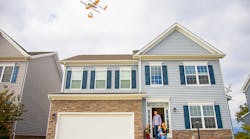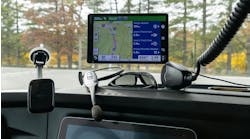In a first for consumer delivery, Alphabet Inc.’s Wing drone service is transporting packages, over-the-counter medication, snacks and gifts to residents of Christiansburg, Va.
After getting an Air Carrier Certificate from the Federal Aviation Administration (FAA) on Oct. 18, Wing became the first company to operate a commercial air delivery service via drone directly to homes in the U.S.
UPS launched a drone airline, Flight Forward, earlier this fall after a successful pilot program of transporting medical specimen at a North Carolina hospital. UPS plans to expand its drone delivery services to other hospitals, universities and corporate campuses around the U.S. Other companies, including Amazon.com Inc.’s Prime Air, also are developing drone-delivery platforms.
But Wing is the first drone business to get FAA permission to allow multiple pilots to oversee multiple unmanned aircraft making commercial deliveries simultaneously to the general public. Alphabet says this will pave the way “for the most advanced drone delivery service in the nation.”
Wing’s collaborators on this service — FedEx Express, Walgreens, and local Virginia retailer Sugar Magnolia — are the first U.S. businesses to offer this form of local air delivery to customers.
FedEx completed the first scheduled e-commerce drone delivery in American history on Oct. 18, according to the second-largest for-hire fleet in the U.S. FedEx says this makes it the first company in the country to connect online retailers to last-mile drone delivery services. Walgreens is also claiming a historic achievement. It provided the contents of the first on-demand, commercial drone delivery directly to a home in the U.S. Through this pilot program, Walgreens becomes the first U.S. retailer to provide customers with on-demand drone deliveries of over-the-counter medications and convenience items.
How it works
Alphabet says that minutes after customers use the Wing app to order from Walgreens or Christiansburg’s Sugar Magnolia, a lightweight aircraft delivers the purchase directly to their homes.
Customers can also receive scheduled FedEx Express deliveries by drone. Upon arrival, the aircraft gently lowers the package to a small, designated location in the yard or driveway, before returning to Wing’s “Nest” in North Christiansburg, nestled in the foothills of the Appalachian Mountains, about 200 miles southwest of Washington, D.C.
Christiansburg resident Paul Sensmeier ordered a birthday gift for his wife Susie that was scheduled for delivery by FedEx Express. The last mile of the delivery, usually done by truck, is being done via the Wing drone. The Sensmeiers have been married for 50 years, and come from a family of engineers and medical professionals.
“We’re always excited about new things,” Mr. Sensmeier said, according to a Wing blog post. Wing’s newness piqued their interest, as did the convenience, according to Mrs. Sensmeier: “It’s not always easy getting up and getting out. Paul broke his leg in June. We know what it’s like to feel stuck sometimes.”
Nearby, in another first for unmanned aviation in the U.S., Michael Collver and his wife Kelly are ordering a cough and cold pack from Walgreens, which includes Walgreens-brand Nice! Tissues, bottled water, Tylenol, Halls cough drops and Emergen-C. “Usually, every time you need something like Tylenol, that’s another car on the road,” Collver said. “It’s a hassle. With Wing, the kids love it, it keeps that car off the road, and it’s good for the planet too.”
The future is up in the air
“This is really a first for Wing,” Jay Merkle, the executive director of the Federal Aviation Administration’s drone-oversight program, told Bloomberg. “It’s amazing that in a year and a half, we’ve gone from uncharted territory to: we’ve got a certified air carrier.”
Earlier this year, UPS partnered with drone-maker Matternet to launch its health care delivery service on the WakeMed campus. The Unmanned Aircraft System Integration Pilot Program was overseen by the FAA and North Carolina Department of Transportation.
UPS Flight Forward has been transporting blood and medical samples from outlying facilities to the labs within the WakeMed hospital network. The drone system "replaces the inefficient and time-consuming ground courier service used currently with a much more efficient and timely unmanned aircraft service," according to a UPS petition to expand its drone business that was filed this summer and granted this fall. "This provides test results and diagnosis to doctors more rapidly, leading to more timely treatment, which in turn improves the patient's health and overall experience."
Along with expanding to more medical campuses around the country, UPS’s longterm plans for Flight Foward include building ground-based, detect-and-avoid (DAA) technologies to verify drone safety. The company plans to build a centralized operations control center to help it run regular and frequent drone flights beyond the operator’s visual line of sight.
UPS also plans to work with drone manufacturers to build new drones of varying cargo capacities as it looks to add new services outside of the health care industry, including the transport of commodities and other regulated goods.




